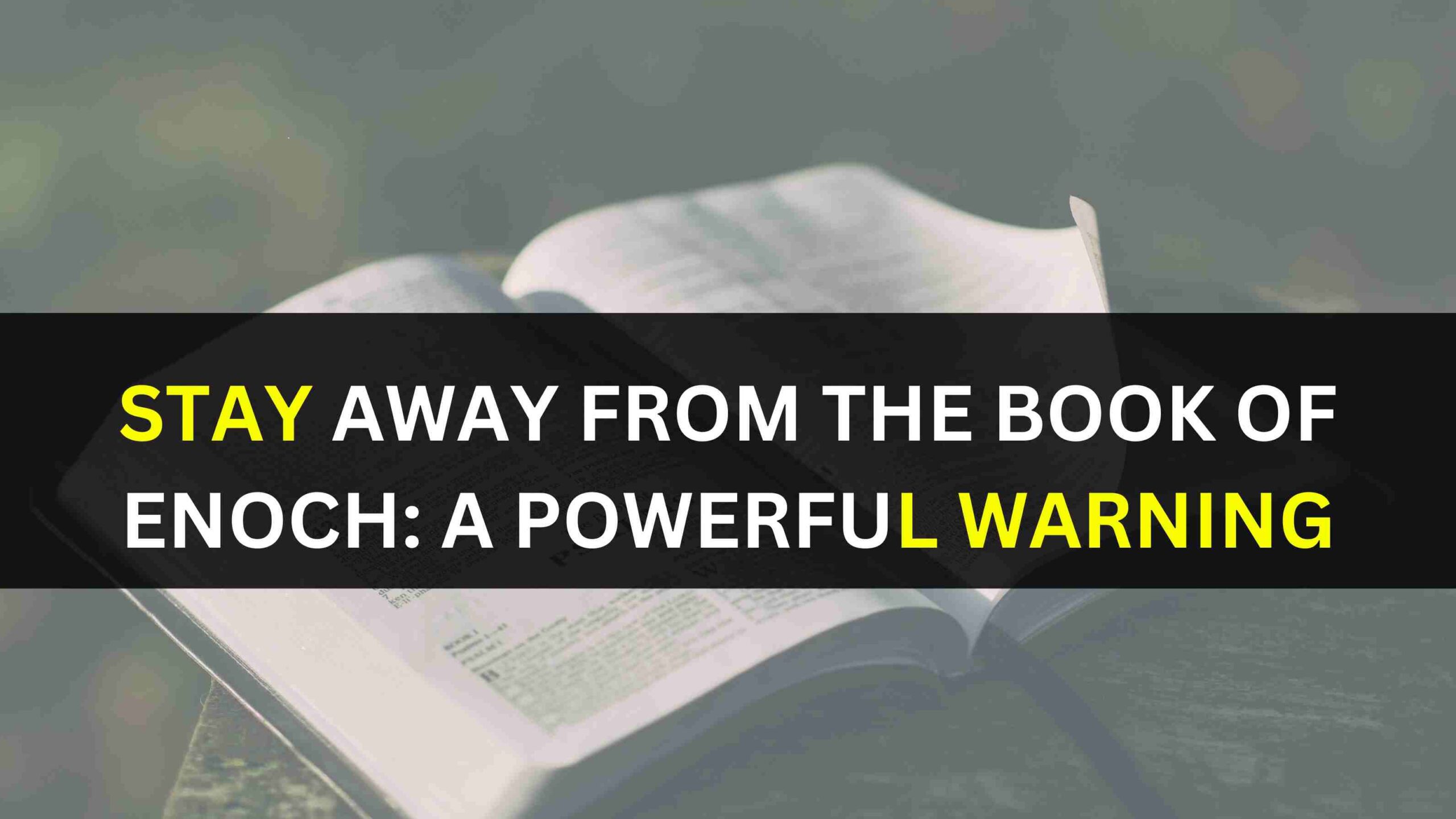Many Christians today are curious about ancient writings like the Book of Enoch, which claims to offer deep spiritual insights and mysterious revelations. This text, often linked to Noah’s grandfather and known for its tales of the Watchers and Nephilim, has stirred interest across the world. However, while it may appear fascinating, it’s important to understand why believers should approach it with great caution. The Book of Enoch is not part of the accepted Christian canon and contains teachings that do not align with biblical theology.
Its content, drawn from ancient Jewish writings, explores themes of angelic rebellion, divine judgment, and apocalyptic visions that can lead to serious spiritual confusion when misinterpreted. This article will explore the dangers of relying on this non-canonical text, why it was rejected by the early church, and why Christians in the USA and beyond should stay rooted in the inspired and trustworthy Word of God.
What Is the Book of Enoch? Understanding the Mysterious Ancient Text Linked to Enoch, the Watchers, and the Nephilim
The Book of Enoch is an ancient Jewish text filled with strange visions, angelic beings, and heavenly prophecies. It is not part of the canonical Scriptures accepted by most Christian churches. Named after Noah’s grandfather, the text claims to describe divine encounters, cosmological themes, and the spiritual corruption brought by the Watchers—a group of fallen angels who descend to Earth. These angels, according to the story, mate with human women and produce the Nephilim, or demonic hybrids, mentioned briefly in Genesis 6. These bizarre stories have caught the attention of many, especially those fascinated with spiritual lore and apocalyptic literature.
The Book of Enoch is made up of five parts: the Book of the Watchers, the Book of the Similitudes, the Book of the Astronomical Writings, the Book of the Dream Visions, and the Book of the Epistle of Enoch. Each section contains apocalyptic visions, messages from archangels like Michael and Raphael, and descriptions of heavenly realms. These writings go far beyond what the Old Testament or New Testament tells us. While some ideas may seem spiritual or mysterious, many teachings from this ancient Jewish text directly contradict Scripture.
Historical Background and Discovery: Where the Book of Enoch Came From and Its Connection to the Ethiopian Church
The Book of Enoch dates back to the Second Temple period, around 300 BC to 100 AD. It was known in ancient Jewish circles but was never fully accepted into the Jewish canon. The complete version was preserved in the Ethiopian Orthodox canon, where it is still considered sacred text. This version, known as the Ethiopic Apocalypse of Enoch, was translated from ancient Greek manuscripts that are now lost. Sections of it were discovered in Aramaic among the Dead Sea Scrolls, giving us evidence that it circulated among some Jewish sects before Jesus was born.
Even though the Ethiopian Church kept this book, most other Christian denominations and church fathers rejected it. Scholars classify it under pseudepigrapha, which means it was falsely attributed to someone—in this case, prophet Enoch. Versions of Slavonic Enoch, Hebrew Apocalypse, and others also exist, showing how different cultures edited and added to the story over time. Still, its lack of clear apostolic teaching and historical accuracy has kept it outside the Bible. Today, people discover it online or in bookstores, often without knowing its non-canonical and dangerous spiritual content.

Also Read –Powerful Scriptures About a Mother’s Love
Why Is the Book of Enoch Not in the Bible? Canon Rejection and Early Church Discernment
Many ask why the Book of Enoch was never accepted into the biblical canon. The answer lies in how the Christian Bible was formed. Early church leaders and church councils, including the Council of Laodicea and Carthage, used strict tests to confirm which texts were truly God-breathed. They checked for apostolic teaching, consistency with other Scripture, and wide acceptance among believers. The Book of Enoch, though popular in some circles, failed these tests. It had pseudepigraphal authorship and strange doctrinal content that confused early Christian beliefs.
While a single quote from Jude (Jude 1:14–15) seems to reference Enoch, that doesn’t mean the entire Book of Enoch is trustworthy. Even Paul quoted pagan poets in Acts, but we don’t include those works in the Bible. Early church fathers like Tertullian, Origen, and Clement of Alexandria commented on Enochian themes, but they never treated it as Scripture. The Muratorian Fragment, one of the earliest lists of accepted books, does not include it. So while the Book of Enoch has historical interest, it lacks divine inspiration and should not guide faith and practice.
Is It a Sin to Read the Book of Enoch? What the Bible Says About Extra-Biblical Texts
Reading non-canonical books like the Book of Enoch isn’t automatically a sin, but it’s spiritually dangerous. The Bible, in verses like 2 Timothy 3:16, tells us that only inspired Scripture is useful for teaching and training in righteousness. When believers treat extra-biblical texts like sacred Scripture, they risk spiritual confusion. The problem isn’t curiosity; it’s allowing such books to shape Christian theology. The Holy Spirit leads us to truth through the Word of God, not through forbidden knowledge.
Scriptures like Deuteronomy 4:2, Revelation 22:18–19, and Proverbs 30:6 strongly warn against adding to God’s Word. The Book of Enoch includes prophetic revelations, angelic rebellion, and magical arts that aren’t consistent with the rest of the Bible. Using it to guide your spiritual life can lead you away from the truth found in Jesus Christ. So, while it may not be a sin to read it historically, trusting in it spiritually is a serious issue.

Theological Contradictions and Doctrinal Errors in the Book of Enoch
The Book of Enoch contains many theological contradictions. It teaches that fallen angels taught humans forbidden arts, which include weapon-making, astrology, and magic. While Genesis 6 gives a short reference to the Nephilim, 1 Enoch expands this story with mythical detail. This promotes a false idea that salvation history depends on angelic beings and their secrets. The focus moves from God’s redemptive plan to a strange blend of heavenly visions and spiritual speculation.
It also distorts the idea of divine judgment. The book speaks of angelic prisons, hidden places of torment, and future cosmic punishment, much of which has no Old Testament or New Testament backing. Its view of the resurrection, final judgment, and Messiah differs from what Jesus and the apostles taught. These kinds of doctrinal errors can confuse readers and weaken their trust in the God-breathed Word of Scripture.
Dangers of Misinterpretation and Spiritual Confusion from the Book of Enoch
Today, many people use the Book of Enoch to support conspiracies and new-age beliefs. Some claim it proves the existence of UFOs, ancient aliens, or links to the Persian magi. Others use it to explain modern demonic activity or the origins of sin. These ideas distract from the truth of the Gospel and focus instead on esoteric writings. This kind of focus leads to spiritual deception, pulling people away from the Holy Spirit’s guidance.
When believers build their faith on non-canonical texts, they often fall into error. Some churches even teach doctrines based on the Book of Enoch, ignoring its lack of scriptural verification. This opens the door to false teachings, just as Paul warned in 2 Peter 3:16, where he says that ignorant people twist Scriptures to their own destruction. It’s not just about reading—it’s about letting these texts shape your view of God, salvation, and truth in Christianity.
Biblical Warnings about Extra-Biblical Writings and Non-Canonical Books
The Bible is clear: God does not want us adding to or taking away from His Word. In Revelation 22:18–19, God promises judgment to anyone who changes the book of prophecy. In Proverbs 30:6, we’re told not to “add to His words.” These Old Testament references and New Testament commands protect the Bible’s authority. Jesus, in His teachings, always quoted the Law, Prophets, and Psalms, never extra-biblical texts like 1 Enoch.
The apostles like Paul, Peter, and John focused only on what the Holy Spirit had revealed. They never gave weight to writings like Baruch, Barnabas, or the Book of the Watchers. That’s why books like Galatians, Colossians, and Thessalonians were recognized and passed down in the Christian canon. The early church fathers worked hard to protect the God-breathed Word, and we must do the same today.
Why Do Some People Still Read the Book of Enoch? Curiosity and the Allure of Forbidden Knowledge
Many people are drawn to the Book of Enoch because it feels mysterious. Some believe it holds secrets that were hidden from the church. Others are simply curious about ancient manuscripts or Second Temple Judaism. They see Enochian themes as rich with spiritual meaning, but forget the danger of spiritual confusion and theological caution. Even some pastors use it in sermons, unaware of its doctrinal errors.
People often say, “It’s not in the Bible, but it helps me understand it.” Or they point to the Jude quote and think that makes it reliable. But this is a mistake. The Book of Jude references an event, not an endorsement of the whole book. We should be careful. When we seek spiritual guidance, we need inspired Scripture, not pseudepigrapha. True understanding comes from God’s Word, not forbidden knowledge.

Trusting the Canonical Bible Alone: Standing Firm on God’s True Word
As Christians, our trust must be in the canonical Scriptures alone. The Bible is complete. It gives us everything we need for Christian living, salvation, and doctrinal soundness. 2 Timothy 2:15 urges us to study and rightly divide the Word of truth. When we add or mix in non-canonical texts, we damage our spiritual authority.
The Holy Spirit works through the Word of God—not through myths, legends, or apocalyptic literature. Books like the Book of Enoch, while interesting in a historical sense, should not be part of our daily walk with Jesus Christ. Scripture is not lacking. It is inspired, trustworthy, and alive. That’s why it remains the one and only source of divine truth for all believers.
Conclusion: Stay Rooted in God’s Word and Guard Your Heart from Deception
In the end, we must ask ourselves—why look elsewhere when God has already spoken? The Book of Enoch might seem fascinating, but it brings more harm than help. It is filled with doctrinal error, spiritual danger, and false scripture. While it may hold interest for scholars or historians, it has no place in the life of a faithful believer seeking truth in Christianity.
Let us stay firm in the Bible, guided by the Holy Spirit, and grounded in the teachings of Jesus Christ. Read the Word daily, meditate on it, and grow in faith. True wisdom, discernment, and eternal life are found not in ancient scrolls but in the living Word of God.
FAQs
Why should I Stay Away from the Book of Enoch?
You should stay away because the Book of Enoch contains many theological errors and spiritual deception that conflict with the biblical canon and can lead to confusion about true Christian faith.
Why is the Book of Enoch forbidden?
It’s forbidden because it is a non-canonical and apocryphal text that was rejected by the early church due to its questionable authorship, false prophecies, and teachings outside inspired Scripture.
What did Jesus say about the Book of Enoch?
Jesus never directly mentioned the Book of Enoch; His teachings emphasize sticking to the God-breathed Word found in the Scriptures and warned against false teachings and added spiritual lore.
Is it okay for Christians to read the Book of Enoch?
Christians are encouraged to focus on the canonical Scriptures for guidance since the Book of Enoch contains extra-biblical ideas that can cause spiritual confusion and are not part of divine inspiration.
Why did God take Enoch?
God took Enoch because he “walked faithfully with God,” showing a close divine encounter. This is a unique example of righteousness and God’s approval in the Old Testament.
What is the main point of the Book of Enoch?
The Book of Enoch mainly focuses on angelic rebellion, the coming divine judgment, and apocalyptic visions, but these ideas differ significantly from biblical theology and lack apostolic teaching authority.
Grace Writings is a passionate believer and Bible enthusiast dedicated to sharing the life-changing power of Scripture. Through carefully selected Bible verses, she aims to inspire, encourage, and guide readers in their daily walk with God. Whether you’re seeking wisdom, comfort, or spiritual growth, her writings point back to the timeless truths of God’s Word. When she’s not writing, she enjoys quiet time in prayer, exploring nature, and serving in her local church.

